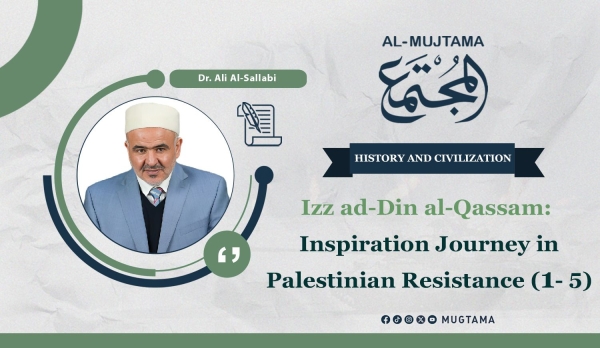Izz ad-Din al-Qassam: Inspiration Journey in Palestinian Resistance (1- 5)
Introduction
The character of Sheikh Al-Mujahid Izz ad-Din al-Qassam (may Allah have mercy on him) is one of the prominent figures in the march of resistance and jihad against French and British colonialism and early Zionist settlement in the 1920s and 1930s of the 20th centuries. Thanks to Allah, and with his charismatic preaching, experience, and steadfastness, along with his role in mobilization, awareness, recruitment, and organization, he was able to lead the revolutionaries of Palestine against the British and Jewish settlers in 1935, making them taste calamities and bitterness for long days and months.
Symbol of Resistance and Jihad
The mujahid Izz al-Din al-Qassam became a symbol of resistance and jihad against colonialism in Palestine, and a model to be emulated in the Palestinian resistance war against the settler "Zionist" enemy, due to his commitment to God's path, his faith, his steadfastness, and the strength of his determination in the pursuit of jihad and victory. The life of this preacher and mujahid from the Levant was nothing more than an extended record of resistance, a river of pursuits, and death sentences. He was a common enemy of the colonial European states, having fought against the French colonizers in his homeland "Syria." He also gathered weapons, organized battalions, and raised financial donations to support the mujahideen in Libya against the Italian occupier. The end of his life was an open war against the British occupation and the Zionists in Palestine. During his relatively short life, he received multiple death sentences; however, these were medals in the records of his memory, and shining pages in the bags of his days.
The Significance of Research
The research into the journey of the fighters and men of national struggle and jihad, such as Sheikh Izz ad-Din al-Qassam (may God have mercy on him), is not limited to being a historical review of an individual's experience. Rather, it is a tracing of the path of this great nation, the jihad of its children, and linking its past with its current reality; in order to comprehend and understand God's past decrees and laws in resisting, trial, succession, empowerment, and civilizational change.
His Birth and Upbringing
Sheikh Muhammad Izz al-Din al-Qassam was born in the city of Jableh in Syria, which is one of the beautiful cities of the Levant close to the Mediterranean Sea, and the largest city belonging to the Syrian city of Latakia. He was born in the year 1300 AH / 1882 AD. Sheikh Izz al-Din al-Qassam comes from a poor family known for its knowledge and piety. His father, Sheikh Abdul Qadir Mustafa al-Qassam, was interested in Sufism, Islamic law, and the Arabic language and its literature. The father married two women; the first was his mother Halima, with whom he had (Fakhr al-Din, Izz al-Din, and Nabiha), and the second was Amina Jaloul, with whom he had (Ahmad, Mustafa, Kamil, and Sharif).
Qassam was the son of a calling man, who lived for the Quran, adorned with the remarkable values of Islam, and embraced the high status of pride in being Muslim. He named his two sons 'Izz al-Din' (Glory of the Religion) and 'Fakhr al-Din' (Pride of the Religion), as if he were preparing them to keep the resonance of these names echoing in their ears in a family renowned for knowledge, calling, and education.
Features of the Scientific and Professional Journey
Sheikh Izz ad-Din al-Qassam spent his childhood in Jableh, where he learned reading, writing, and arithmetic in its elementary schools. His father taught him religious sciences, and he was one of the students who frequented the corner of (may God have mercy on him), where he studied language, interpretation, hadith, and jurisprudence.
In Jableh, Al-Qassam received part of his Islamic and linguistic knowledge, and he immersed himself in it during his youth, before moving at the age of fourteen with his brother Fakhr al-Din to Al-Azhar Mosque to study religious sciences. Cairo at that time was a vessel of culture navigating through a tumultuous sea of crises and tribulations faced by the Islamic world, among which was the British occupation that had firmly entrenched its claws into the face of the radiant land of Egypt. At Al-Azhar, Al-Qassam studied extensive Islamic knowledge and was influenced by the prominent scholars and sheikhs of that era, such as Sheikh Muhammad Abduh, Muhammad Rashid Rida, and the struggling leaders like Mustafa Kamal and Saad Zaghloul, along with other revolutionary voices that were striking violently with deep intellectual and political force against the walls of silence, ignorance, and defeat. After years, he returned bearing his academic certificate to Syria, and the Egyptian experience left a significant impact on his academic and practical life.
How Are Leaders Made? Hamas as a Model


